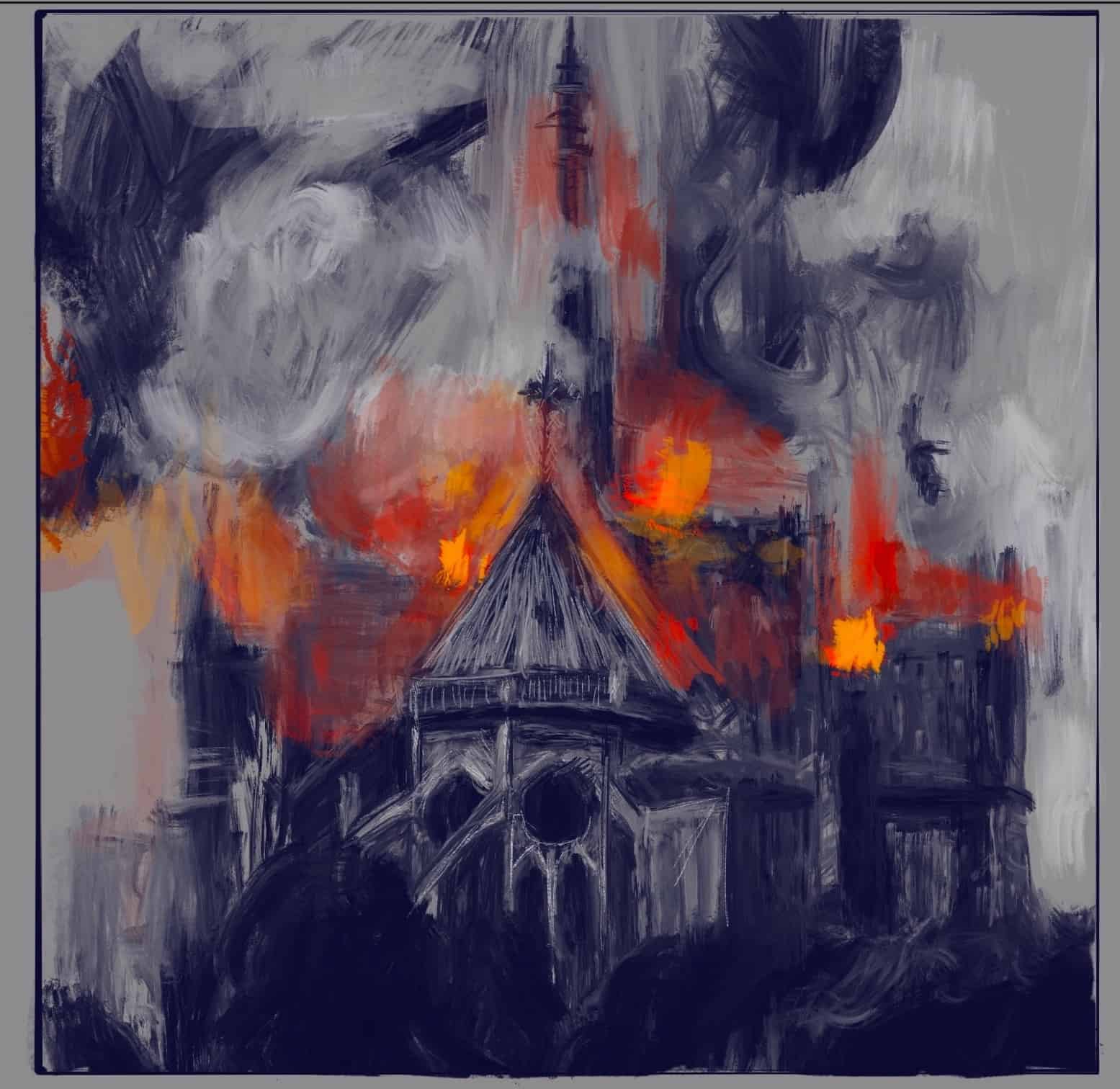Monday of Holy Week:
I found out about the fire at Notre Dame from a student on her way out of class on Monday. I walked from my classroom to my office, scrolling through the twitter images of the spires, flames, blackened stone, and crowds aghast in horror of the scene. Staring at the images of the people watching, I felt like I want to join them. I wonder if they felt the same tightening that I feel in my chest.
I imagine that we share this deep sense of loss, history and beauty—gone. As I watch videos of Parisians singing an Ave Maria as the steeple collapses into a sanctuary of flames, I hum along with them, joining that unsatiated heaviness and loss.
Tuesday of Holy Week:
In the middle of track practice on Tuesday afternoon, a voice came over the intercoms at the school:
“Important announcement. This is a lock-out procedure. Students are to be escorted indoors by faculty and staff. All students who have their cars may leave but must leave immediately. All events, practices, and activities are cancelled for the day.”
There had been a credible threat to schools in the Denver area. A young woman, described by authorities as “infatuated by Columbine,” had arrived in Denver and procured a gun and ammunition. Her self-described “pilgrimage” to Denver sent sheriff’s departments, the FBI, and the schools into heightened security on the edge of the 20th anniversary of the tragedy. She was only 18 years old.
Tuesday evening, near midnight, most of the schools in the Denver area—including mine—cancelled school on Wednesday.
Wednesday of Holy Week:
On Wednesday I awoke to a text from a colleague: “Looks like we’ll be having school tomorrow. They found the girl dead near Mt. Evans. So, are we still good for our meeting?”
Though I confirmed the meeting and began adjusting my lesson plans for the next day, I couldn’t help searching for the story of this young woman. I should feel relief—we should all feel relief, but I don’t.
There is a tension in sitting with gratitude that no students were hurt and that she didn’t do the unthinkable, and also realizing that the end of this story is still a tragedy. The minor inconvenience of the day off of school provided me and my students an extra day of grading and end-of-year preparation, but my students and I have no idea how to feel about that.
Thursday Morning:
Thursday morning, the school community gathered and prayed for the young woman whose threat shut down an entire city—we also prayed for her family and their pain. As the prayer was read, students, faculty, and staff stood in utter silence. Even in the usual restlessness and energy of nearly two thousand teenagers, there is a quiet pause at the prayer. It was as if collectively, everyone was holding their breath.
When the bell rang and the students sprinted towards Easter break, I might have been imagining it, but there was much less laughter and silliness in the air than usual.
Approaching Easter Heavy-Hearted:
The flames of Notre Dame have left a film of soot over the week—it was an accident, sure, but how does that make me feel any better about seeing such beauty and history destroyed?
The young woman’s violence, hatred, and pain have left a stain upon my calendar and my view of the world—she was mentally ill, sure, but how does that make the world safer or more caring?
The week has been one of heavy-heartedness. Instead of smiling at the approach of Easter, I feel weighed down by the burdens of this week. How are we supposed to feel about these tragedies?
I think back to the way in which the disciples approached this week. They started with the triumphal entry into Jerusalem, a king’s welcome. They had dinner together with Jesus, expecting and celebrating what they thought would be the beginning of his temporal kingship. And then, all their plans and expectations were shattered. How must they have felt?
Similarly, Jesus’s week began with crowds singing his praises, only to later scream his condemnation. His quiet, intimate dinner with friends became a reminder of the upcoming betrayal. And when he needed support and prayer in the garden, he found himself alone. How heavy must those burdens have been?
I can only imagine the tensions within their chests are similar to what we’re facing this week. A sorrow for the loss of something beautiful. The horror of seeing genuine evil and the ugliness in the world. The confusion of pointless tragedy. And under it all, the nagging feeling that somehow, somewhere, in some way this must make sense… It must matter. Right, God?
That’s the prayer of the heavy-hearted. It’s a wrestling with God in the desperate longing for consolation and resurrection in the midst of pain. Despite it being uncomfortable, it’s exactly the attitude we carry into the mystery of Easter. It’s not a prayer of changing things that have already happened, or even begging to understand them, but it’s an attitude of yearning for the empty tomb. Yearning to feel closer to God despite the struggle. Yearning for a world in which fire won’t destroy something beloved and beautiful. Yearning for hope in the midst of violence and fear.
We, like the disciples and Jesus, have to make it through this Holy Week of struggle in order to approach that empty tomb. That road, despite our desires for it to take us elsewhere, goes through the Cross.
Perhaps as we enter the final days in the lead up to Easter, we can take the time to seek out those crosses—those moments within our lives which leave us heavy-hearted—and ask God to enter those specific spaces with His Son’s Resurrection. Because, Easter and the Resurrection came to answer the prayers of the heavy-hearted.
***
A special thanks to Jonathan Harmon, SJ who generously allowed us to use his artwork for this piece. More of his work can be found on instagram: @jharmonsj


